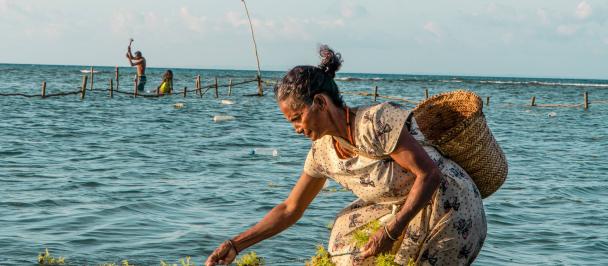A workshop on expanding cooperation on the management of small transboundary rivers in the region was held in Ferghana
March 29, 2024

Effective management of transboundary water resources is critical for the development of Central Asian countries. In this context, the Ferghana Valley is of particular significance for the coastal states. Climate change, population growth and water consumption by economic sectors, with the observed trends in decreasing flows into water sources, require urgent measures to ensure water and food security.
In this regard, on March 26 in Fergana, UNDP, along with the International Water Management Institute (IWMI), organized a workshop on “Transboundary water cooperation: Identifying tasks on the way to expanding cooperation using the example of the Fergana Valley” topic. The event was organized within the framework of a joint project "Climate Change and Resilience in Central Asia" with the Hydrometeorological Service Agency under the Ministry of Ecology, Environmental Protection and Climate Change of the Republic of Uzbekistan, funded by the European Union.
It was attended by experts from the Ministry of Water Resources of Uzbekistan, the Water Resources Service under the Ministry of Agriculture of Kyrgyz Republic, the National Water Partnership of Kyrgyz Republic, as well as representatives of the Hydrometeorological Service Agency of Uzbekistan and relevant university specialists of both countries.
The results of assessing regional cooperation in transboundary water resources joint management are discussed using the example of small transboundary rivers of the Syrdarya basin, in particular Akbura and Isfayramsay, which are the main sources of food security in the Ferghana Valley and vulnerable to climate change.

“This event became a platform for knowledge and experience sharing between scientists of the two countries. They discussed current issues of transboundary river management face to face and measures that need to be taken to bring cooperation to a new level. As a result, proposals such as the development of a system for training specialists, more active knowledge sharing between countries, automation of gauging stations, ensuring data openness, and a corridor for experts were put forward. Participants highlighted the importance of involving stakeholders, including private companies, NGOs, as well as increasing the role of women in decision-making on water resources management,”— said Shavkat Kenjabaev, national researcher at IWMI.
Experts came to the conclusion that it is necessary to take into account climate risks in basin planning and increase regional cooperation on this issue.
The discussions focused on water-related climate risks for economic sectors and proposed mitigation and adaptation options, such as conducting regular qualitative and quantitative monitoring of rivers, as well as the risks of natural disasters associated with climate change; carrying out constant exchange of information up and downstream of rivers; taking measures to protect the banks and growing crops that consume less water; in addition, strengthening automation and digitalization of planning, management and distribution of water.

 Locations
Locations







